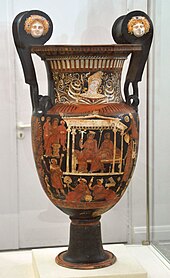Megara (daughter of Creon)

Megara ( Greek Μεγάρα ) is the daughter of King Creon of Thebes and wife of Heracles in the Theban sagas of Greek mythology .
With Heracles, Megara had several children, the number of which, according to tradition, varies between two and eight. They were all killed, with tradition differently motivating the circumstances of their death. According to the 2nd century BC Grammarist Lysimachos living in the 4th century BC they were killed by strangers, others name the Theban arrogant of rule Lykos as the perpetrator, while Socrates of Argos , a historian of the 3rd century AD, blames Augeias for the death of the children. The older versions of the myth, on the other hand, already knew Heracles as the murderer of his children, according to Stesichoros in the 6th century BC. And Panyassis 5th century BC Chr.
It was only the Athenian playwright Euripides who completely redesigned the narrative in his tragedy Herakles . Now Creon gave him his eldest daughter to wife after Heracles had done great deeds for Thebes in the war against Orchomenus . When Heracles later goes into the service of Eurystheus in order to earn the right to return to Argos , Lykos takes power in Thebes, kills Creon and his sons and threatens to murder Megara and her children. Heracles returns in time from one of his tasks to bring the hellhound Kerberos to the upper world, and kills Lykos. During the subsequent atonement, he was overcome by madness sent by Hera. He thinks he has to kill Eurystheus and his sons, but delusional kills Megara and their children. With a clear mind again and persuaded by Theseus , whom he had freed from Hades , Heracles leaves Thebes and finds acceptance in Athens .
The Euripidean train with the murder of Megara by Heracles was rarely taken up in ancient literature. The Theban sagas only know the solution to the marriage with Megara, which Herakles, according to the library of Apollodorus and Diodorus, now gave to Iolaos , the relative and faithful companion of many of his adventures, as a wife. Only in Diodorus is the old motif of madness , already known to Kypria, directly linked to the service of Eurystheus: Heracles, discouraged in view of the tasks ahead for Eurystheus , struck Hera madly, whereupon Heracles tried to kill Ioalus with the arrows met his children.
literature
- Theodor Heinze: Megara 1. In: The New Pauly (DNP). Volume 7, Metzler, Stuttgart 1999, ISBN 3-476-01477-0 , Sp. 1138.
- Otto Jessen : Megara 1 . In: Wilhelm Heinrich Roscher (Hrsg.): Detailed lexicon of Greek and Roman mythology . Volume 2.2, Leipzig 1897, Sp. 2542-2546 ( digitized version ).
- Susan Woodford: Megara 1 . In: Lexicon Iconographicum Mythologiae Classicae (LIMC). Volume VIII, Zurich / Munich 1997, pp. 828-829.
Remarks
- ↑ Homer , Odyssey 11,269 f.
- ↑ Pindar , Isthmische Oden 4,63, speaks of eight, Hyginus , Fabulae 31,32,72, and others speak of two; other traditions mention 3, 4, 5 or 7 children; see. Otto Jessen : Megara 1 . In: Wilhelm Heinrich Roscher (Hrsg.): Detailed lexicon of Greek and Roman mythology . Volume 2.2, Leipzig 1897, Col. 2542 f. ( Digitized version ).
- ↑ Lysimachus in the Scholion at Pindar, Isthmische Oden 4,104.
- ↑ Scholion zu Statius , Thebais 4,570: here is Megara the daughter of Lycus, who wed her to Heracles, then Hera punished her with madness and kills his grandchildren; as the perpetrator also in the Scholion at Pindar, Isthmische Oden 4,104.
- ↑ Scholion zu Pindar, Isthmische Oden 4,104, cf. FGrHist 310 F 9 ( online ).
- ↑ Narrated in Pausanias 9:11, 2.
- ↑ So also Diodorus 4,10,6, and the library of Apollodor 2,4,11.
- ↑ Seneca , Hercules furens ; Hyginus , Fabulae 31.32.72.241.
- ↑ Pausanias 10:29, 7.
- ↑ Libraries of Apollodor 2, 6, 1.
- ↑ Diodorus 4,31,1.
- ↑ Plutarch , Amatorius 9, even knows the age of the two at this point in time: Ioalus was only 16, Megara was already 33.
- ↑ Diodorus 4.11.